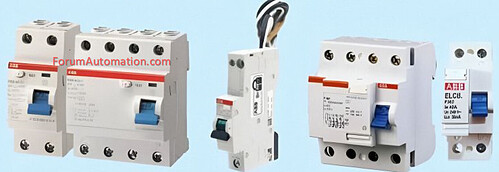What is the difference between RCCB, RCBO and ELCB?
What is RCCB and its function?
An RCCB (Residual Current Circuit Breaker) is mainly designed to identify leakage current by comparing phase and neutral currents.
If there is a difference, it indicates that current is leaking potentially via a human body and the equipment trips to avoid electric shock.
RCCBs are built on modern core balance transformer technology & adhere to Kirchhoff’s current law.
They are frequently employed in residential and commercial installations to keep people safe, but they do not provide overload or short-circuit protection. To ensure complete safety, they are frequently combined with MCBs.
What is an RCBO?
An RCBO (Residual Current Breaker with Overcurrent Protection) gives additional protection by combining the capabilities of an RCCB and an MCB.
It prevents
- Leakage currents,
- Overloads and
- Short circuits.
Leakage protection functions similarly to that of an RCCB whereas overload protection is provided via a bimetallic strip that bends when heated and short-circuit protection is handled by an electromagnetic coil that trips instantaneously.
RCBOs are appropriate for high-risk circuits such as kitchens, baths and outdoor connections, where both human and equipment safety are essential.
However, they are more costly and occupy more space on distribution boards than RCCBs.
What is ELCB and why is it used?
An ELCB (Earth Leakage Circuit Breaker) is an older type of protection device that detects the voltage difference between equipment and the ground. If the potential difference reaches a predetermined limit, the ELCB disconnects the circuit.
These devices were previously employed to defend against insulation failures & earth leakages yet they are less sensitive than RCCBs & do not offer overload (or) short-circuit protection.
Because of their conventional electromechanical technology, RCCBs and RCBOs have mostly replaced them in current electrical networks.
Difference between RCCB, RCBO and ELCB
RCCBs are preferable when MCBs are already present, RCBOs are the most dependable option for circuits prone to both leakage and overcurrent problems, and ELCBs are already obsolete & must be avoided in new installations.
| Device | Full Form | Main Function | Protection Provided | Technology | Working Principle | Common Use | Limitations | Best Used When |
|---|---|---|---|---|---|---|---|---|
| RCCB | Residual Current Circuit Breaker | Detects leakage current (difference between phase & neutral) | Protects people from electric shock due to leakage currents | Core Balance Transformer (modern) | Based on Kirchhoff’s Current Law – phase current = neutral current; imbalance → trip | Residential & commercial buildings for people protection | No overload or short-circuit protection | When you already have MCBs in place for overload/short-circuit, but need leakage protection |
| RCBO | Residual Current Breaker with Overcurrent Protection | Combines leakage, overload, and short-circuit protection | Protects both people (leakage) and equipment (overload/short) | Combination of RCCB + MCB (thermo-magnetic + leakage detection) | Leakage → same as RCCB; Overload → bimetal strip bends (thermal); Short-circuit → electromagnetic trip | Bathrooms, kitchens, outdoor circuits, high-risk areas | Costlier than RCCB; bulkier in large DBs | When both leakage protection & overload/short-circuit protection are required in one device |
| ELCB | Earth Leakage Circuit Breaker | Monitors voltage difference between equipment body & earth | Protects against voltage leakage to earth | Old electromechanical technology | Trips if potential difference between equipment body & ground exceeds limit | Rare today – used in old installations | Outdated, less sensitive, no overload protection | Not recommended now; replaced by RCCB/RCBO |
You can also follow us on AutomationForum.co, Facebook and Linkedin to receive daily Instrumentation updates.
You can also follow us on ForumElectrical.com , Facebook and Linkedin to receive daily Electrical updates.
